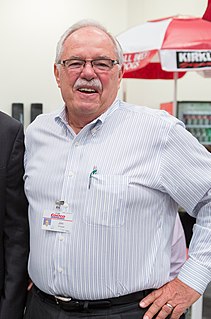A Quote by Warren Buffett
Long ago, Ben Graham taught me that "Price is what you pay; value is what you get." Whether we're talking about socks or stocks, I like buying quality merchandise when it is marked down.
Related Quotes
I buy stocks when they are battered. I am strict with my discipline. I always buy stocks with low price-earnings ratios, low price-to-book value ratios and higher-than-average yield. Academic studies have shown that a strategy of buying out-of-favor stocks with low P/E, price-to-book and price-to-cash flow ratios outperforms the market pretty consistently over long periods of time.
Edge also implies what Ben Graham....called a margin of safety. You have a margin of safety when you buy an asset at a price that is substantially less than its value. As Graham noted, the margin of safety 'is available for absorbing the effect of miscalculations or worse than average luck.' ...Graham expands, "The margin of safety is always dependent on the price paid. It will be large at one price, small at some higher price, nonexistent at some still higher price."
Successful investors like stocks better when they’re going down. When you go to a department store or a supermarket, you like to buy merchandise on sale, but it doesn’t work that way in the stock market. In the stock market, people panic when stocks are going down, so they like them less when they should like them more. When prices go down, you shouldn’t panic, but it’s hard to control your emotions when you’re overextended, when you see your net worth drop in half and you worry that you won’t have enough money to pay for your kids’ college.
I've got a sweater." Ben pulled off his coat and held it out for her. "Here." "Thanks, Ben. It's lovely and warm." Then she said, "Ben, I-- I can tell you how I feel about-- about everything. I think you're the best friend I've ever had. I-- I'd lie down and die for you if you wanted me to." "Honey," Ben said. "When I get you to lie down for me it won't be to die.
I love talking about the Kennedy assasination. The reason I do is because I'm fascinated by it. I'm fascinated that our government could lie to us so blatantly, so obviously for so long, and we do absolutely nothing about it. I think that's interesting in what is ostensibly a democracy. Sarcasm - come on in. People say Bill, quit talking about Kennedy man. It was a long time ago, just let it go, alright? It's a long time ago, just forget it. I'm like, alright, then don't bring up Jesus to me. As long as we're talking shelf life here.
Volatility is a symptom that people have no idea of the underlying value-that they have stopped playing the asset game. They're not buying because it's a company with certain attributes. They're buying because the price is rising. People are playing games not related to any concept at all of what the long-term value of the enterprise is. And they know it.
If you know how to value businesses, it's crazy to own 50 stocks or 40 stocks or 30 stocks, probably because there aren't that many wonderful businesses understandable to a single human being in all likelihood. To forego buying more of some super-wonderful business and instead put your money into #30 or #35 on your list of attractiveness just strikes Charlie and me as madness.






























